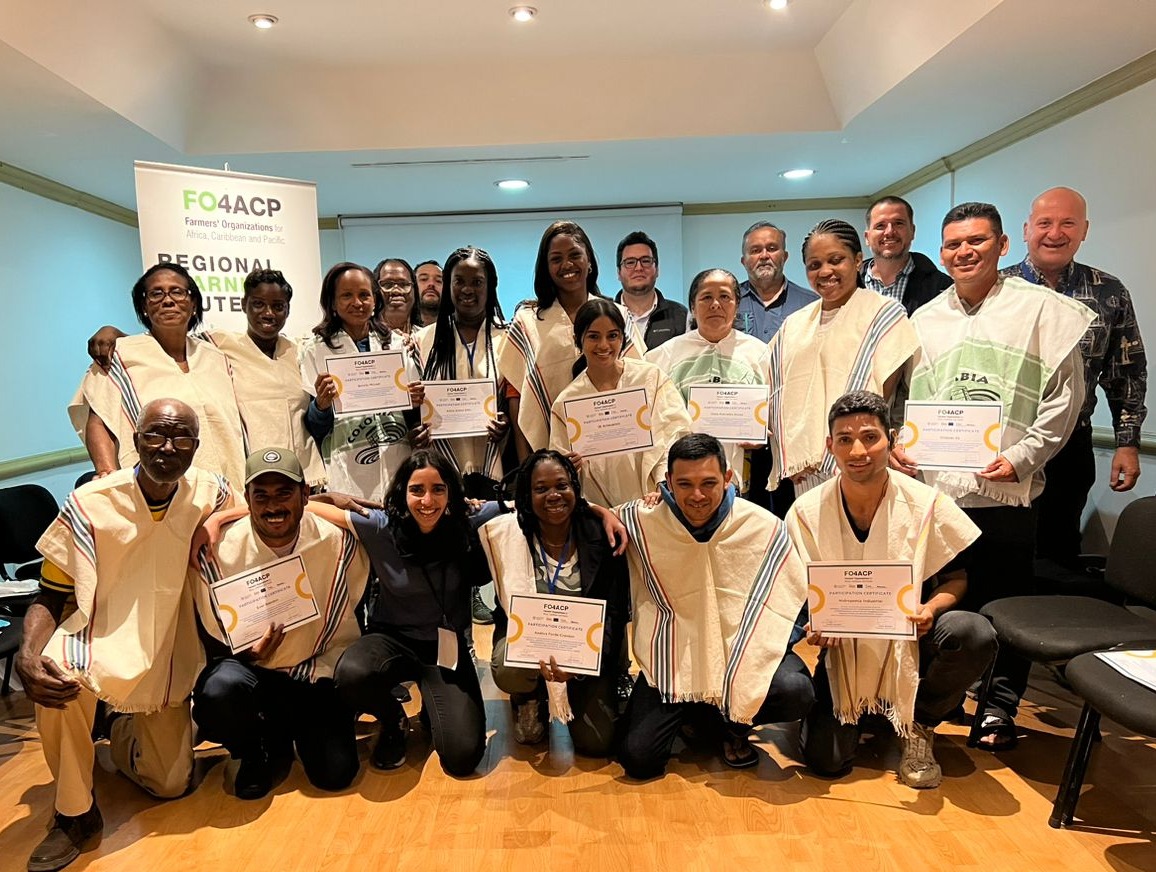Regional Learning Route organized by FAO and Procasur ends with a commitment to “Strengthen associative capacities to promote innovation”.
The Regional Learning Route organized by FAO and the Procasur Corporation, in which 13 representatives of farmers' organizations from the Caribbean participated, has shared practices that promote associativity, strengthen business organization and facilitate market access

Regional Learning Route, Colombia
©FAO / José Negrón Valera
For more than a week, representatives of 13 farmer organizations from Jamaica, Belize, Guyana, Grenada and St. Lucia met in Colombia for the I FO4ACP Regional Learning Route. Through a peer-to-peer methodology, participants visited best practices and learned more about the principles, benefits and challenges associated with associative marketing in the agricultural sector, as well as the main strategies for the development of farmers' organizations to ensure access to and consolidation in markets.
As part of the Farmers Organizations for African, Caribbean and Pacific (FO4ACP) programme, funded by the International Fund of Agricultural Development and the European Union, the itinerary of the Regional Route took participants to cases and experiences that highlighted small agricultural enterprises that have a solid associative trajectory and participate in relevant value chains in their communities and territories. From the first day, participants in the Regional Route had the opportunity to learn first-hand successful agricultural production experiences and innovative ways of establishing commercial and institutional alliances to improve the quality of life of farmers.
Althia Giles, a Guyanese farmer and representative of Pomeron Exporters and Producers Association, said, "The idea of this Learning Route is amazing. The idea of putting a group of farmers, in the same place, with other farmers who have gone through the same problems and how they have managed to face and solve them, really helps our own organizations to become better and better".
The experiences visited were, Association of Lulo producer of the municipality of Belén de Umbría (ASLUBEL), Association of high-quality coffee producers Cuchilla de San Juan, Apia's Avocado Producers Association, Industrial Hydroponics, 18 Artesanos, Hydroponic Lettuce and Urban Farmers, these last four in the departments of Cundinamarca and Bogotá
Diego Echeverry, president of ASLUBEL, considered that the importance of this kind of experience is that it allows him to transmit important information to other farmers about how they have managed the different stages of the productive, commercial and institutional processes to be successful.
For Echeverry, one of the essential tasks to be undertaken by the participants with regard to their own organizations refers to the need to incorporate youth into the different farmers' associations and guarantee generational relief in agricultural work.
"Incorporating innovation and technology strategies induces young people to stay in the countryside and see agriculture as an option for the future. Incorporating young people is a priority social responsibility strategy," said Echeverry.
Juan Moreno, president of Procasur Corporation, considered the importance of this Regional Route to be that the participants had the opportunity to exchange experiences and lessons learned with farmers who have already faced challenges in production and organization and have been able to overcome them.
As a result, the representatives of the farmers' organizations made extensive use of the experience generated by the different agricultural production experiences in Colombia to collectively develop innovation plans to strengthen business management, service delivery and market access in their respective countries.
Carmen Nurse, president of the Caribbean Network of Rural Women Producers valued the Learning Route "as an opportunity to change our vision of how to be better producers, and it also allowed us to understand the value of associative work as a mechanism to strengthen our farmers' associations. For Nurse, learning about agricultural production experiences in Colombia, especially those that incorporated new technologies, was a revelation.
"The Learning Route showed us that with passion, innovation and organization it is possible to achieve great transformations in the way we see agriculture. In addition, the experiences also showed us that the organized incorporation of women in our agricultural organizations is not only important but a priority."
Simon Cuthbert, Jamaican farmer and representative of New Era Farmers Benevolent Society, valued this Learning Route as a "great experience for young farmers in the Caribbean"
“Most important is learning that being part of an organization is not an easy task, but one that involves great commitment, being persistent and achieving a shared vision to reach the organization's goals.", said Cuthbert.
As a follow-up, FAO and Procasur Corporation will provide technical assistance and financial support to implement the innovation plans in each country and connect them with the other activities from the FO4ACP as part of a roadmap to strengthen the Farmers’ Organizations capacities to provide better services for their members and increase their participation in value chains.
Contact
José Negrón Valera Communications specialist [email protected]
